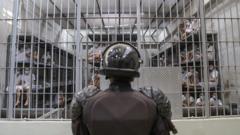Future diplomatic relations hinge on Saturday's preliminary talks, aiming to establish a framework for further negotiations.
**US-Iran Nuclear Negotiations: Low Hopes but Necessary Talks Ahead**

**US-Iran Nuclear Negotiations: Low Hopes but Necessary Talks Ahead**
Amidst significant distrust, U.S. and Iranian officials prepare for crucial discussions regarding Iran's nuclear program.
In a notable international development, U.S. and Iranian officials are gearing up for preliminary dialogue concerning Iran's nuclear program, scheduled for Saturday in Oman. Despite limited expectations for significant breakthroughs, both sides acknowledge the necessity of continued talks, particularly given the heightened geopolitical tensions surrounding the Middle East.
The impending meeting marks the potential for the first face-to-face negotiations since President Trump withdrew the United States from the 2015 nuclear accord, which was established with Iran and several other global powers. The discussions will primarily serve as a preliminary assessment of whether a sustainable pathway toward more comprehensive discussions can be forged.
American representatives are approaching the talks amidst a backdrop of skepticism and high-stakes diplomacy, following President Trump’s previous withdrawal from the nuclear deal and the imposition of stringent sanctions on Iran. The trend of mutual distrust remains ingrained; however, Iranian officials have expressed a readiness to engage meaningfully, as signified by Foreign Minister Abbas Araghchi, who remains open to reaching an agreement.
Key objectives for this Saturday's dialogue include establishing a negotiation framework and agreeing on a timeline for future talks. Uncertainties loom over whether direct communication will occur between the diplomats or if they will rely on intermediaries to relay messages, as previously indicated by Iranian officials.
As the geopolitical landscape continues to evolve, the outcome of these discussions could significantly influence the trajectory of U.S.-Iran relations and broader stability in the Middle East.
The impending meeting marks the potential for the first face-to-face negotiations since President Trump withdrew the United States from the 2015 nuclear accord, which was established with Iran and several other global powers. The discussions will primarily serve as a preliminary assessment of whether a sustainable pathway toward more comprehensive discussions can be forged.
American representatives are approaching the talks amidst a backdrop of skepticism and high-stakes diplomacy, following President Trump’s previous withdrawal from the nuclear deal and the imposition of stringent sanctions on Iran. The trend of mutual distrust remains ingrained; however, Iranian officials have expressed a readiness to engage meaningfully, as signified by Foreign Minister Abbas Araghchi, who remains open to reaching an agreement.
Key objectives for this Saturday's dialogue include establishing a negotiation framework and agreeing on a timeline for future talks. Uncertainties loom over whether direct communication will occur between the diplomats or if they will rely on intermediaries to relay messages, as previously indicated by Iranian officials.
As the geopolitical landscape continues to evolve, the outcome of these discussions could significantly influence the trajectory of U.S.-Iran relations and broader stability in the Middle East.





















